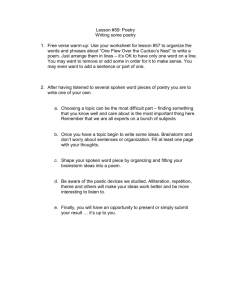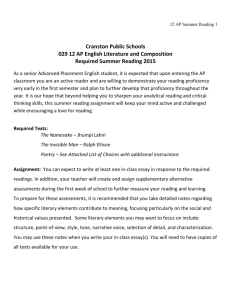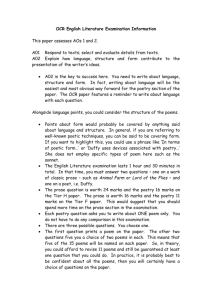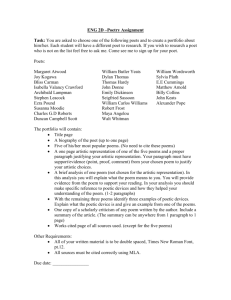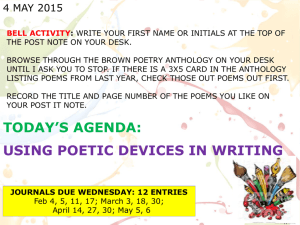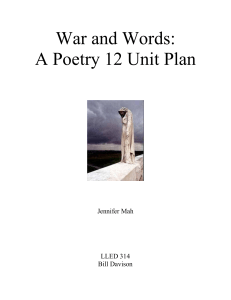Lesson Plan Example: Found Poetry (Two fifty
advertisement
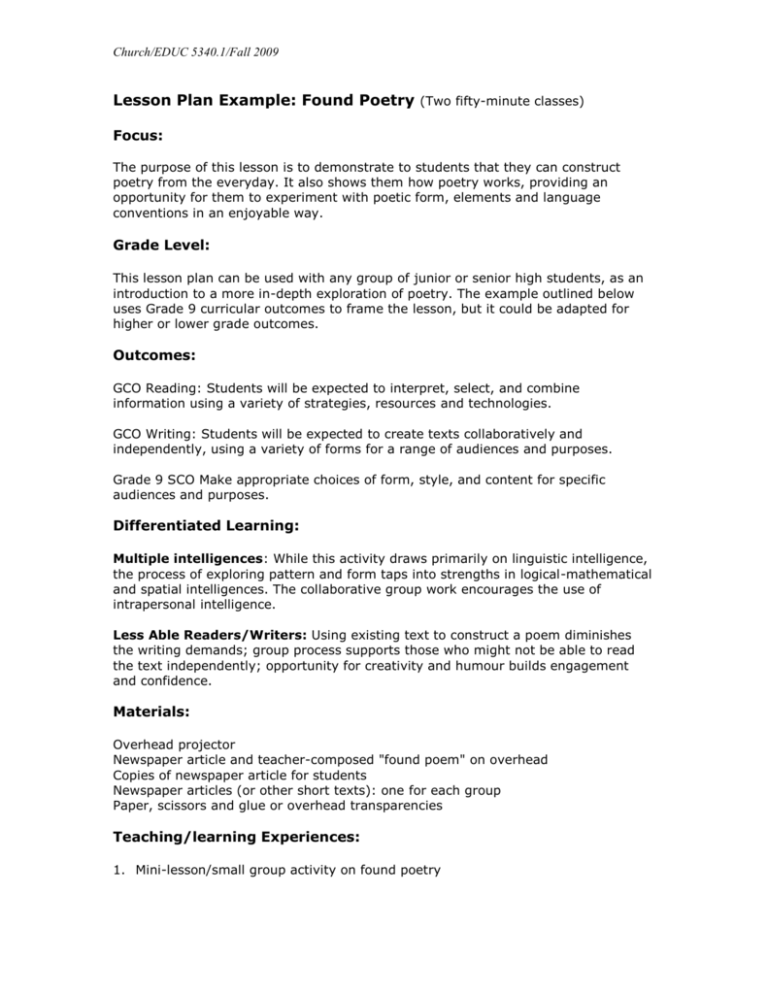
Church/EDUC 5340.1/Fall 2009 Lesson Plan Example: Found Poetry (Two fifty-minute classes) Focus: The purpose of this lesson is to demonstrate to students that they can construct poetry from the everyday. It also shows them how poetry works, providing an opportunity for them to experiment with poetic form, elements and language conventions in an enjoyable way. Grade Level: This lesson plan can be used with any group of junior or senior high students, as an introduction to a more in-depth exploration of poetry. The example outlined below uses Grade 9 curricular outcomes to frame the lesson, but it could be adapted for higher or lower grade outcomes. Outcomes: GCO Reading: Students will be expected to interpret, select, and combine information using a variety of strategies, resources and technologies. GCO Writing: Students will be expected to create texts collaboratively and independently, using a variety of forms for a range of audiences and purposes. Grade 9 SCO Make appropriate choices of form, style, and content for specific audiences and purposes. Differentiated Learning: Multiple intelligences: While this activity draws primarily on linguistic intelligence, the process of exploring pattern and form taps into strengths in logical-mathematical and spatial intelligences. The collaborative group work encourages the use of intrapersonal intelligence. Less Able Readers/Writers: Using existing text to construct a poem diminishes the writing demands; group process supports those who might not be able to read the text independently; opportunity for creativity and humour builds engagement and confidence. Materials: Overhead projector Newspaper article and teacher-composed "found poem" on overhead Copies of newspaper article for students Newspaper articles (or other short texts): one for each group Paper, scissors and glue or overhead transparencies Teaching/learning Experiences: 1. Mini-lesson/small group activity on found poetry Church/EDUC 5340.1/Fall 2009 Display the example of a found poem written by the teacher on the overhead and read it to the students. Invite responses. Then, distribute the newspaper article from which the poem was written. In small groups the students discuss the differences in the two accounts for about ten minutes. Each group should be prepared to share one difference they noted. Lead a whole group debriefing/discussion, nudging students to notice the differences in feelings evoked, form, language and conventions. Ask them to consider the kinds of decisions that poets make. Discuss and record on chart paper or overhead the insights about how poetic language works generated through the discussion and teacher input. 2. If time allows that day or at the beginning of the next class introduce a follow-up small group activity in which students will construct their own found poems. Remind students about the insights that they generated regarding poetic language. Explain that they will have an opportunity to try constructing their own found poems. Distribute a newspaper article to each of the groups. Depending on the class, distribute paper, scissors and glue or overhead transparencies. Students work in small groups to construct their poems. Teacher circulates to offer suggestions and observe work in progress. In the final 15 minutes of class each group reads its poem aloud. Audience asked to respond to the poem and to identify examples of poetic language and form used. Assessment for learning: Teacher observation during whole class discussion and small group activities to gather information on students' knowledge of poetic language and form as well as reading strategies that students use to locate words and phrases to include in their poems. Review of draft writing to assess application of insights regarding poetic language and form. This information to be used in planning further instruction. Assessment of Learning/Evaluation/Marking Using a rubric, students will self-assess and the teacher will assess each student's contributions to group process during collaborative writing. This will contribute to students' class marks for the term. Teacher Reflection How well did the students handle the whole group discussion? What other questions could I have posed to elicit more thoughtful responses? To what extent were students on-task during the small group activities? What additional scaffolding might they need? Are the students ready to move on to the next experience I have planned? What preparation will they need?






